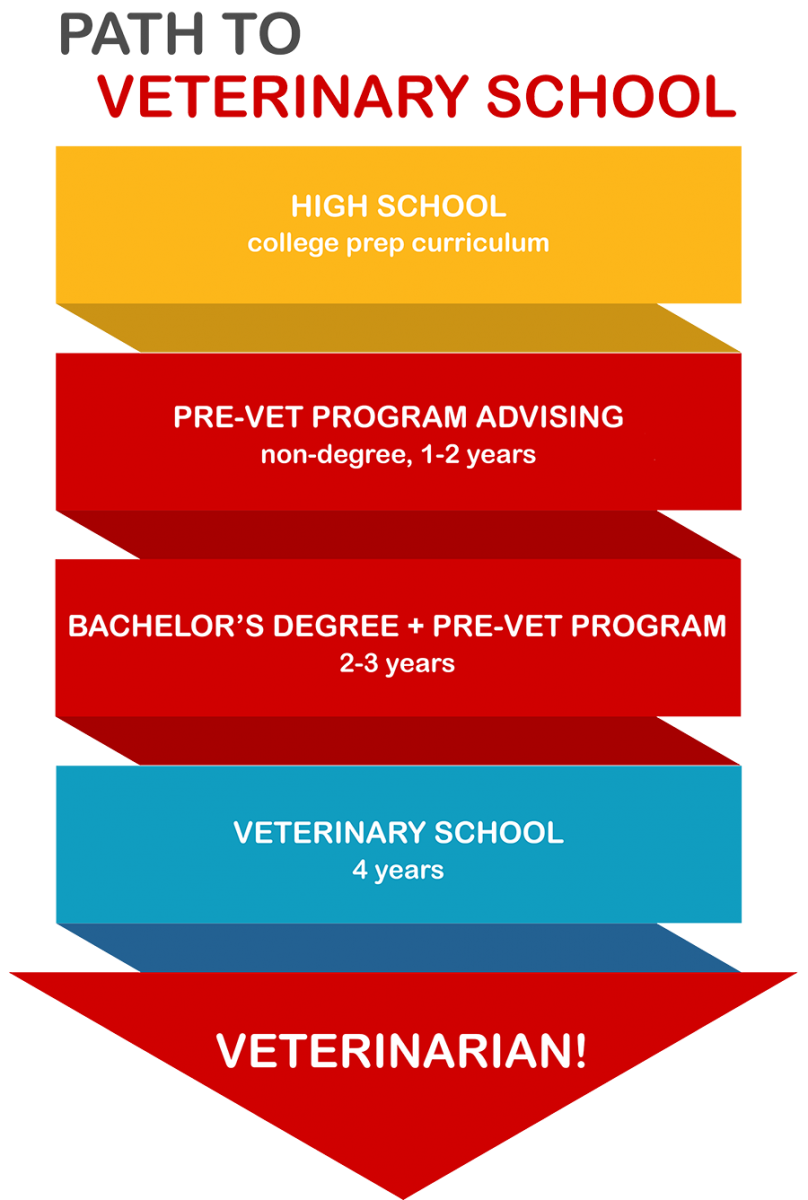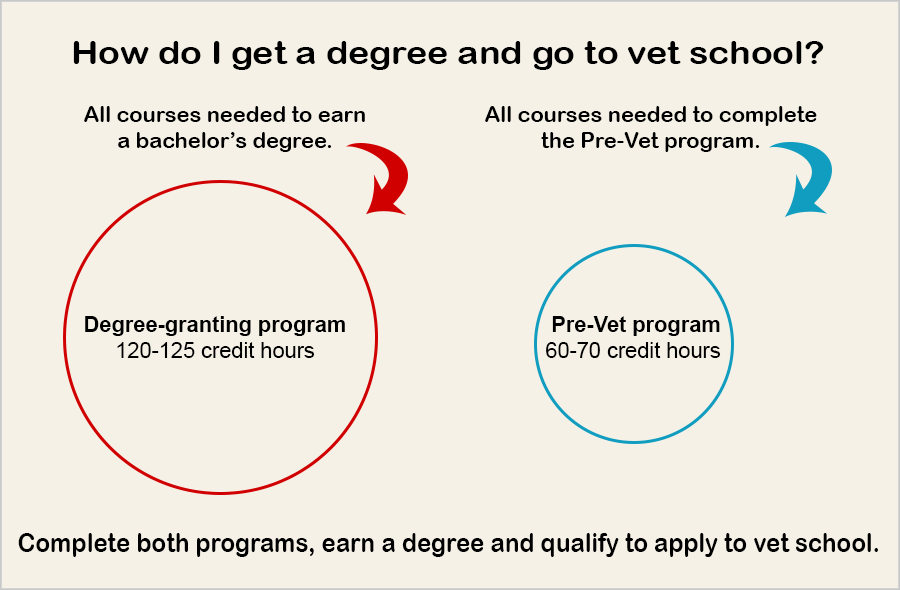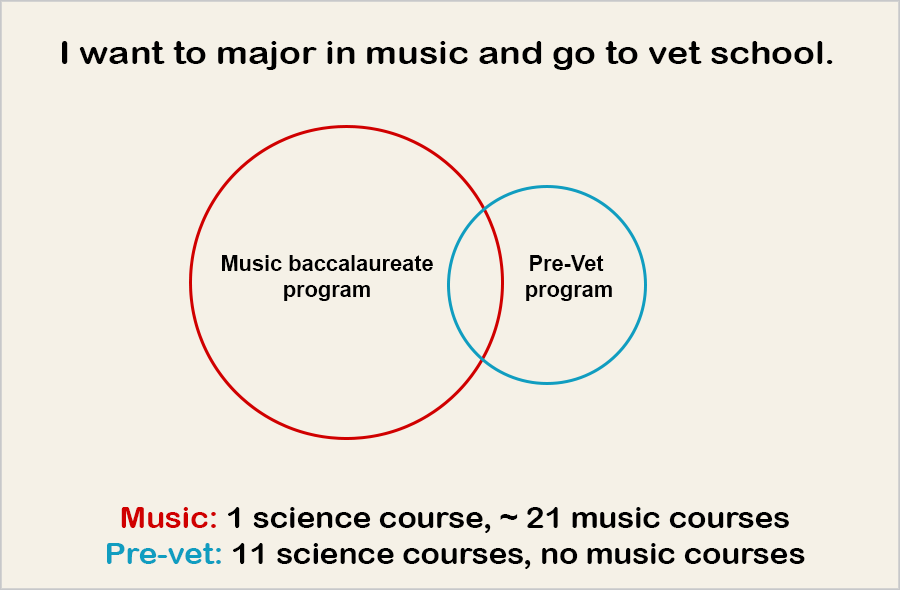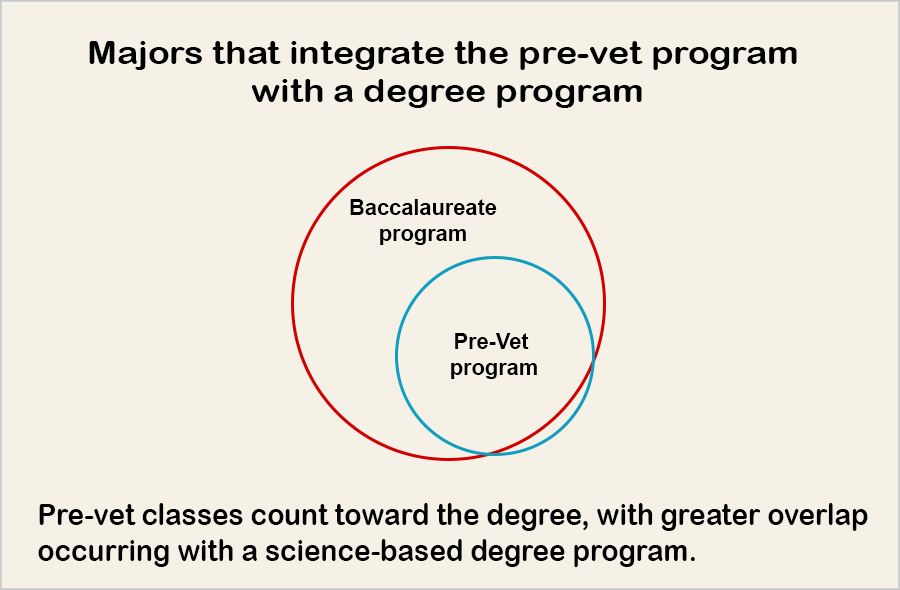
The path to veterinary school
Every veterinary school establishes the college course requirements needed to qualify for admission to its DVM program. These courses are referred to as "pre-vet requirements." Pre-vet requirements vary and comprise about half the credit hours required for a bachelor's degree. For this reason, there is no bachelor's degree in pre-vet. This gives you an opportunity to earn a degree whatever subject interests you. Veterinary school selection committees don't care what your degree is in as long as you meet the pre-vet requirements.
Although there is no bachelor’s degree in pre-vet, the program allows you to be advised from the beginning by people who specialize in advising for veterinary school. Since vet schools don’t care what subject your degree is in (and they really DON’T care!), you can select any one of the many majors at the University of Nebraska–Lincoln. Your pre-vet adviser will work with you to determine which bachelor’s degree program will best match your interests, talents, and career goals. You have as long as the first two years in the pre-vet program before you have to decide which degree program you want to pursue, so you don’t have to decide today.
Pre-Vet and Degree Program
Every veterinary school establishes the college course requirements needed to qualify for admission to its DVM program. These courses are referred to as "pre-vet requirements." Pre-vet requirements vary and comprise about half the credit hours required for a bachelor's degree. For this reason, there is no bachelor's degree in pre-vet. This gives you an opportunity to earn a degree whatever subject interests you. Veterinary school selection committees don't care what your degree is in as long as you meet the pre-vet requirements.
Although there is no bachelor’s degree in pre-vet, the program allows you to be advised from the beginning by people who specialize in advising for veterinary school. Since vet schools don’t care what subject your degree is in (and they really DON’T care!), you can select any one of the many majors at the University of Nebraska–Lincoln. Your pre-vet adviser will work with you to determine which bachelor’s degree program will best match your interests, talents, and career goals. You have as long as the first two years in the pre-vet program before you have to decide which degree program you want to pursue, so you don’t have to decide today.



What are the most-selected degree programs for students who want to go to vet school? Here are a few of the most popular. To learn more about each one, go to Nebraska Admissions and search the alphabetical list of majors.
- Animal Science
- Veterinary Science
- Fisheries & Wildlife
- Biochemistry
- Forensic Science
Preparation beyond your degree program
Admission to vet school is competitive, and you’ll want to do everything you can to set yourself apart. Veterinary schools evaluate applicants in three areas:
- Academic Preparation—Courses and grades
- Career Exploration—Shadowing/working with a veterinarian
- Leadership Development—Involvement in clubs and organizations
An easy way to remember the three components is to think A-C-L.
Preparation in each A-C-L area usually begins in high school (A-C-L: Keys to admission has tips and hints for you) and continues in college. Your pre-vet adviser will help you develop a strategy.
What if you decide not to become a vet?
Typical pre-vet students like to be prepared for every possibility. Many ask what will happen if they decide not to be a veterinarian.
- It’s perfectly ok to decide not to be a veterinarian. We’ll help you prepare for vet school until YOU tell us you’d rather go a different direction. Even if you decide not to be a veterinarian, we still work with you to determine the next steps on your path and help you get started.
- For many students, this is where your degree program comes in. Your degree program will help prepare you for an additional career or strengthen your knowledge base in a subject, even if you continue to vet school. That’s why it’s so important to work with your pre-vet adviser to determine the best degree program for YOU.
- The courses you take as a pre-vet major meet requirements for the degree programs selected by most pre-vet students. Chances are good the courses you complete will apply toward your new degree.
- The best news is that even if your career goals change, the University of Nebraska–Lincoln offers a wide variety of degree programs. With so many options, we will have a degree program that suits your new goals.
Where should you go to vet school?
Your most economical choice for veterinary school is either your home state veterinary school or the veterinary school with which your state has an agreement. One of the best resources for locating your home state’s options is the VIN Foundation website.
Nebraska's Professional Program in Veterinary Medicine
Although Nebraska students can go anywhere, there is a special program open only to Nebraska residents. This program is the Professional Program in Veterinary Medicine (PPVM), a cooperative program between the University of Nebraska–Lincoln and Iowa State University. The program is fully accredited by the AVMA (American Veterinary Medicine Association).
Approximately 25 Nebraska students are chosen each year to participate in the PPVM. They complete their first two years of vet school in Lincoln on East Campus, and the final two years on the Iowa State campus in Ames, Iowa. These students will pay resident tuition for all four years of their professional veterinary school. Learn more about Nebraska's veterinary program.